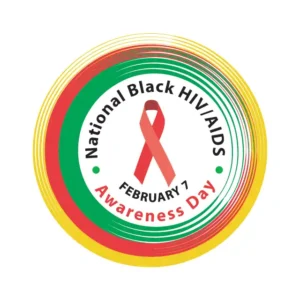National Black HIV/AIDS Awareness Day 2024: Upcoming Webinars
Posted February 2, 2024Content from HIV.gov

February 7 is National HIV/AIDS Awareness Day (NBHAAD), which was first observed in 1999. This observance is a day to acknowledge how HIV disproportionately affects Black people.
Black communities have made great progress in reducing HIV. Yet racism, discrimination, and mistrust in the health care system may affect whether Black people seek or receive HIV prevention services. These issues may also reduce the likelihood of engaging in HIV treatment and care. NBHAAD is an opportunity to increase HIV education, testing, community involvement, and treatment among Black communities.
This year’s theme is “Engage, Educate, Empower: Uniting to End HIV/AIDS in Black Communities”.
- Engage: Discussing ways to better involve the black community in HIV/AIDS prevention and treatment efforts. This can include outreach programs, community partnerships, and utilizing local leaders and influencers to promote HIV testing and destigmatize the conversation around HIV/AIDS.
- Educate: Focusing on improving HIV/AIDS education among black youth and adults. This could cover the latest research, treatment options, understanding of PrEP and PEP medications, and debunking myths that contribute to stigma and discrimination.
- Empower: Highlighting success stories and strategies that have effectively empowered black individuals living with HIV/AIDS. Empowerment can be through advocacy, policy change, access to care, and support systems.
Upcoming Webinars
2024 National Black HIV/AIDS Awareness Day Webinar
Join My Brother’s Keeper, CDC’s Robyn Fanfair, Us Helping Us’s DeMarc Hickson, and Let’s Stop HIV Together ambassador Christopher Walker on February 7 at 2 PM ET for the NBHAAD webinar. The panel will explore this year’s theme. Register for the webinar here!
HIV Learning Network – The Dual Identity of Being Black and a Healthcare Professional
Date & Time: 2/8/2024 – 12:00 PM – 1:00 PM Pacific Time
Join us for the next HIV Learning Network session on February 8 @ 12:00pm (Pacific): The Dual Identity of Being Black and a Healthcare Professional, by Aunsha Hall-Everett, EdD, MA, Capacity Building Assistance Manager, California Prevention Training Center
Description: Healthcare professionals already face the chance of burnout due to growing workloads, increased demands, and the stress of responding to emerging local healthcare needs and crisis. Black healthcare professionals are often recruited to reach Black patients often identified as a priority population in health care initiatives, putting additional pressure on them to represent their community and respond to their needs. This reveals a system of structural racism that exacerbates likelihood of burnout. In this session, Dr. Aunsha Hall-Everett, EdD, MA, shares their experience of the dual identity of being Black and a public health professional. In doing so, they’ll describe the impact structural racism has in public health departments, and identify workplace racial inequities among Black healthcare professionals. We will then discuss strategies to support Black healthcare professionals who play a vital role in reduction of health disparities in communities with or at risk of acquiring HIV.
Free CME’s Offered! Click below to learn more and register.
Breaking Boundaries & Building Solutions:
Confronting Medical Misogynoir and Obstetric Racism in HIV Care
Click on session titles to register for each session
 Join us for “Breaking Boundaries & Building Solutions: Confronting Medical Misogynoir and Obstetric Racism in HIV Care”, a three-part series designed to spark curious, compassionate, and courageous conversations about—and changes in—care inequities and injustices that uniquely and disproportionately impact U.S. (United States) Black women with and at risk for HIV. The three-part series utilizes narrative analysis, interactive lectures, expert panels, group discussions, Q & A sessions, anonymous online polling with real time data visualization, and scholarship from the social sciences, humanities, nursing, medicine, legal studies, and bioethics. The intended audience includes people working in direct service provision, administration, financing, advocacy, activism, organizing, education, research, evaluation, and implementation or improvement science.
Join us for “Breaking Boundaries & Building Solutions: Confronting Medical Misogynoir and Obstetric Racism in HIV Care”, a three-part series designed to spark curious, compassionate, and courageous conversations about—and changes in—care inequities and injustices that uniquely and disproportionately impact U.S. (United States) Black women with and at risk for HIV. The three-part series utilizes narrative analysis, interactive lectures, expert panels, group discussions, Q & A sessions, anonymous online polling with real time data visualization, and scholarship from the social sciences, humanities, nursing, medicine, legal studies, and bioethics. The intended audience includes people working in direct service provision, administration, financing, advocacy, activism, organizing, education, research, evaluation, and implementation or improvement science.

